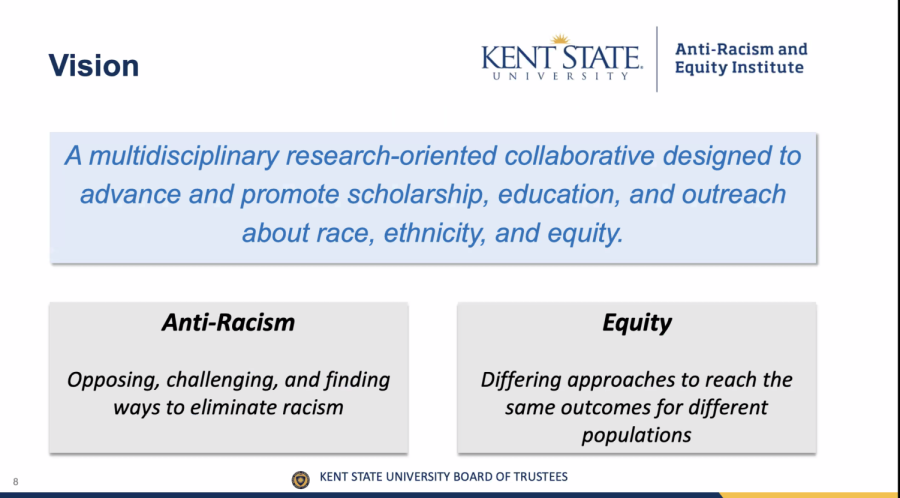Board of Trustees approves Anti-Racism and Equity Institute, amid the racial climate
March 10, 2021
The university’s plan to establish diversity will be the new focus of an institution approved by the Board of Trustees in a Zoom meeting Wednesday.
The Anti-Racism and Equity Institute will host faculty, students, staff and community members across disciplines to advance race and anti-racism scholarship, activism and education, according to a press release about the institute. The institute will host researchers and educators in multiple departments, colleges and campuses in a collaborative structure.
“The creation of this institute is very timely,” said Mandy Munro-Stasiuk, interim dean of College of Arts and Sciences, “as it acknowledges the history of Black events and organizations at Kent State while simultaneously addressing the contemporary manifestations of racism and other social inequities today.”
As Black Lives Matter protests appeared across the country in the summer of 2020 after the death of George Floyd, the university community saw discriminatory messages on the campus’ rock, where many students paint positive words.
In fall 2020, Black United Students presented a list of demands to President Todd Diacon to address racism on campus. Action steps were put in place to ensure the safety of Black students and the Anti-Racism Task Force was formed.
Two former emeritus professors in the Department of Pan-African Studies, who helped establish Black education at Kent State, both died this semester.
Edward Crosby, founder of the department, dedicated his life to empower and educate Black students and Timothy Moore became the first Black dean of the College of Arts and Sciences.
“The creation of this institute, which continues to address the issues of anti-racism and equity for our students and for our society, would be something that both of these emeritus professors would very much have wanted to see,” Munro-Stasiuk said.
More than 100 faculty members, spanning 30 different disciplines from the university’s colleges, have expressed interest in joining the institute.
A faculty fellows’ program, visiting professionals in residence, annual symposia and speaker events will be included in the institute’s activities. A seed grant program and scholarship opportunities for undergraduate and graduate students will also be included.
“An institute creates a large community of scholars,” said Paul DiCorleto, vice president for research and sponsored programs. “What’s important is they’re in diverse disciplines that really helps move the topic forward.”
The Board of Trustees also approved the Environmental Science and Design Research Institute.
The institute “builds upon the exceptional accomplishments over the past four years of the current initiative, bringing together researchers from multiple disciplines,” according to a press release about the Board of Trustees meeting released Wednesday.
The institute reinforces the university’s goal to create a culture of research and innovation, according to the press release. Funded research in multiple areas will also take place.
Participants include 56 faculty members, which represent seven colleges. Some of the colleges represented include the College of Architecture and Environmental Design and the College of Arts and Sciences.
The initiative launches pilot funding programs, supports student research and hosts a national symposia. Regional and national collaborations with other universities and nonprofits have taken place.
“It helps to have an institute that brings people together across department lines,” DiCorleto said.
More than $8 million of grant funding has been received in the last five years. The university invested around $100,000 for pilot projects, which included data collection for competitive grant applications.
University funds, sponsored programs and philanthropy will help support the institute, according to the press release.
To conclude the meeting, Eboni Pringle, the dean of University College, announced the first-generation award, which was given due to the university’s success in attracting and retaining first-generation college students.
The award was given by the National Association of Student Personnel Administrators and the Suder Foundation for the university’s involvement with students who will be the first in their family to receive a college degree.
Nearly 40 percent of Kent’s State enrolled students are first-generation students, 60 percent of Kent State first-generation students graduate within six years of enrollment, but nationally only 20 percent of first-generation students graduate within six years of enrollment.
“It celebrates our students,” Pringle said, “who, despite all of the odds, earn a degree that the entire family can celebrate.”
Kelly Krabill covers administration. Contact her at [email protected].












